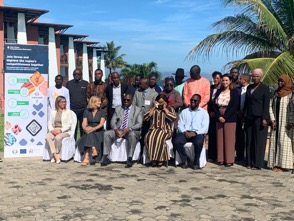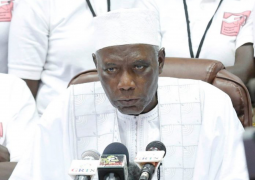
The West African Competiveness Observatory platform is designed to support the competiveness of West African countries by providing key data and insight in trade flows, market opportunities and competiveness indicators, thus facilitating informed decision making and strategic planning.
The forum underway at African Princess, is being held under the framework of the West African Competiveness Programme (WACOMP), coordinated by the ECOWAS and financed by European Union. It attracted participants from eight ECOWAS nations.
Welcoming the gathering, Lily French, Ecowas Ambassador to The Gambia, described the initiative as important in their effort to enhance the region's competitiveness by providing the right tools and knowledge to inform strategic policymaking.
She reminded that pillar 3 of the ECOWAS Vision 2050 aims to deepen the process of economic integration through “improving interconnectivity and regional competitiveness.”
This vision, she added, states a clear objective to strengthen the competitiveness of West Africa by enhancing the production, transformation, and export capacities of the private sector.
“This objective is firmly supported by regional SME strategies and initiatives. This includes notably the West Africa Common Industrial Policy (WACIP) and the Private Sector Development Strategy, which seek to develop productive and trade capacities as well as regional value chains.”
She spoke of their specific goal, which is to improve the performance and growth of selected priority sectors and value chains in goods, along with related services.
“By so doing, we aim to stimulate their contribution to industry, regional trade, and global exports. This targeted approach ensures that our efforts are not only impactful but leverage on the unique resources and strategic advantages of the West African region in order to enhance our global competitiveness.”
Also speaking, Enrica Pellacani, head of Cooperation for the European Union Delegation in The Gambia, reminded that the European Union’s partnership with West Africa is rooted in a shared vision of economic growth, regional integration, and sustainable development.
“We recognise that trade is a powerful engine for development, capable of driving poverty reduction, creating jobs, and fostering economic resilience. However, achieving these goals is not without its challenges, particularly in a region as diverse and dynamic as West Africa.”
She noted that one of the key challenges is the issue of trade competitiveness, adding that while West Africa is rich in resources and has a young, dynamic population, the region’s trade performance is often constrained by structural barriers.
She made reference to inadequate infrastructure, limited access to finance, and a lack of market information.
“Moreover, the region’s integration into global value chains remains limited, with many countries relying heavily on the export of raw materials rather than value-added products. This limits the potential for job creation and economic diversification.”
The European Union, she added, is keenly aware of these challenges, and that is why “we are committed to support initiatives that enhance trade competitiveness and regional value chain development.”
Declaring the forum open, Baboucarr O. Joof, minister for Trade, Industry, Regional Integration and Employment, while thanking the ITC for their foresight in organising such an important training, acknowledged that the training represents not just another step forward in our ongoing journey towards economic development, but a critical opportunity to deepen the understanding of the challenges and opportunities that lie ahead.
“In The Gambia and across West Africa, trade competitiveness is more than just a policy goal—it is a necessity. Our economies, whilst rich in resources and potential, face numerous challenges that must be addressed if we are to compete effectively in global markets. These challenges include infrastructure deficits, limited access to finance, inadequate market information, and the need for stronger institutions that can support trade and investment.”
“One of the most pressing issues we face is the integration of our economies into regional and global value chains. The potential of regional value chains to drive economic growth and create jobs is immense, yet the realisation of this potential has for the longest, been hindered by non-tariff Barriers, limited trade logistics including transportation and storage facilities, lack of harmonised standards as well as poor quality infrastructure. These barriers not only reduce our competitiveness but also limit the ability of our businesses, particularly small and medium-sized enterprises (SMEs), to access new markets and expand their operations.”
Michela Esosito, PhD, ITC statistician, expressed similar sentiments, further thanking partners for their efforts.




